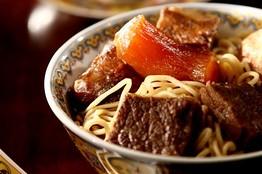
A $324 bowl of beef noodles at Niu Ba Ba in Taipei, Taiwan
Four years ago, Taiwanese restaurateur Wang Cong-yuan asked his VIP clientele--local celebrities, three-star Michelin chefs, and world politicians--how much they would pay for a bowl of his best beef noodles. The most common answer he received: 10,000 New Taiwan dollars (US$324).
For whatever reason, the figure stuck. Mr. Wang printed it on the menu of his Taipei restaurant, Niu Ba Ba ("Beef Father" in Chinese).
Today, the small 40-seat eatery is known among many foodies for serving the world's most expensive bowl of beef noodles. Niu Ba Ba has a lower-priced beef-noodle bowl--called "ordinary beef noodles" on the menu--that costs a more affordable NT$200. But Mr. Wang gets requests for his most expensive bowl almost every day.
It took the chef 15 years to perfect his recipe, which includes just 120 grams of noodles, five four-inch squares of beef, one piece of tendon, and of course, soup. Here, he explains why he charges more than a six-course meal for each bowl.
Four countries of beef: Chefs often cite import costs as a reason for high price tags, but Mr. Wang takes it to another level. For one bowl of noodles, he uses cuts of beef from four different countries: Japan, Australia, the U.S. and Brazil (for the beef tendons).
Custom cuts: Meats are most tender when cut against the grain, but that can be tricky when dealing with different parts of the cow. Mr. Wang cuts every piece in a specific shape perfectly suited to how the meat and tendons meet. For example, the Japanese beef is frozen slightly to ensure cleaner cuts whereas Australian beef is slowly scooped out from the side of the bone after cooking.
Freezing: There's a reason why some leftovers taste better the next day-more flavor has had time to seep in. "No matter how long you boil the meat, it'll turn the texture to mush before the flavors rea'ly marinate and develop," says Mr. Wang. He uses a technique where he slow-braises the meat over three days, and freezes the individual pieces every night so they can rest in between. The process for all the different cuts of meat takes about one week.
Soup blending: Mr. Wang, who studied architecture in Taiwan, says he "builds" his soup. Using five or six different stocks, each distilled from various parts of the beef-tendons (for collagen), tenderloin (for that "meaty" taste), bone (for a smooth but hearty texture)-he blends the final soup similar to the way perfumers craft a scent. The resulting taste is "beefy," but not "gamey" and there is a signature "velvety" texture to the broth and no greasiness.
Noodles: Originally made in-house when the restaurant opened 20 years ago, the noodles are now made in a nearby Taiwan factory using an exclusive Niu-Ba-Ba recipe. But to keep his customers happy, Mr. Wang offers more than 20 different varieties of noodles--thick to thin, flat to round-and will cook them to order based on the customer's choice of al dente.
Minimal seasoning: Besides soy sauce, rock sugar, and some five spice, nothing else is used to season the beef broth. "The idea is to keep things as natural as possible and let the flavor of the ingredients shine," says Mr. Wang, who sees many additional seasonings, like wine, as bad for your health. "I've had customers take my soup base to labs to ensure that it doesn't have any carcinogenic ingredients in it."
Niu Ba Ba. Zhongxiao East Road, Sec. 4, Alley 27, Lane 216, No. 16, Taipei, Taiwan. Tel: 886-2-2778-3075





